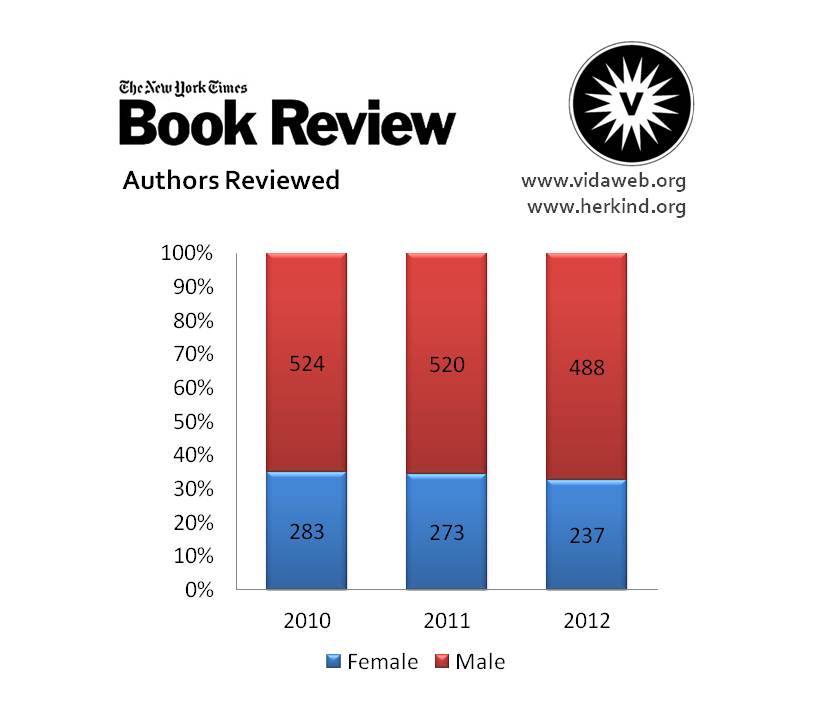It’s Time for a More Inclusive Book Review
For more than a few years now, America’s literary community has been talking about the the gender imbalances that take place in mainstream book reviewing. Each year, VIDA: Women in Literary Arts compiles the data to show that male writers are still getting reviewed disproportionately in comparison to women writers; each year, the mainstream media sniffs at the so-called bean-counting approach to literary criticism and attempts to turn its deficiencies into strengths by claiming they’re focused on the books that “really will endure,” as former New York Times Book Review editor Sam Tanenhaus put it.

I’ve talked about this a lot over the years. I’ve even described how, as a reviewer, I’ve fallen into the same traps despite my best efforts when I’m writing about books here or for other outlets. And the gender gap is only part of the problem: Though it’s gotten less media attention, some critics have pointed out that, if we look at the ethnic backgrounds of the writers getting reviewed by the mainstream press, it’s an awfully white looking field. So, after all this time spent clamoring for change and not seeing it, I began asking myself: What do I want to do about this?
20 January 2014 | uncategorized |
Why Do We Even Do Criticism, Anyway?
In September of 2013, The New York Times Book Review launched a new column called Bookends. They’ve got a pool of eight columnists, and every week, they set up a different pair to answer “pressing and provocative questions about the world of books” like “Are We Too Concerned That Characters Be Likable?” or “What’s Behind the Notion that Nonfiction Is More ‘Relevant’ Than Fiction?” The answers in the first two months have struck me, with few exceptions, as fairly shallow—much like the questions themselves, concocted so as not to disrupt the digestion of the reader’s Sunday brunch.
The installment asking “How Do We Judge Books Written Under Pseudonyms?” particularly bugged me, in part because it’s a question with a fairly obvious answer: “The same way you judge any other book—on its merits.” Francine Prose basically ignores the question, offering a glib list of writers who published some work under pseudonyms, and some speculation as to why they might want to—eminently ignorable filler, from start to finish. It’s when Daniel Mendelsohn weighs in that things start to get a bit more interesting… but, I think, a lot more wrongheaded.
At first glance, Mendelsohn might seem to be tackling a more compelling variation of the question: “How ought we to consider novels written under pseudonyms?” Unfortunately, he also seems to regard the pseudonym—at least in the case of J.K. Rowling, who used the pen name “Robert Galbraith” to publish the novel The Cuckoo’s Calling—as a cheat. (He actually says “trick.”) Rowling took up the Galbraith name because she wanted the novel to be appraised without respect to her reputation; “but although the desire to be judged on one’s merits alone can strike us as noble,” Mendelsohn counters, he’s not sure “criticism untainted by knowledge of who the author is and what she has already done is desirable in the first place—or, indeed, valid.”
That’s right: Mendelsohn just raised the possibility that if you aren’t familiar with an author and her work, you won’t have anything valid to say about an individual book.
Of course, one might more usefully frame the issue by asking, “To whom should criticism be desirable and valid?” By talking abstractedly about the role of the critic, the essay doesn’t seem to waste much time escalating its response from “to Daniel Mendelsohn” to “to any right-thinking reader,” and that’s where I have to get off the bus. Now, I agree with Mendelsohn that connecting an individual work to the author’s oeuvre gives critics an opportunity to tell a very interesting story about that work—but that isn’t the only interesting story a critic can tell about the work, and to suggest, even in passing, that it’s the only valid way to tell a story about that work feels rather ridiculous. (In fairness, even Mendelsohn backpedaled from that implication when we had a polite exchange on Twitter the day after his essay ran.)
Specifically, I would consider the notion The Cuckoo’s Calling cannot be sufficiently appreciated without knowing about the role of J.K. Rowling as its true author, or that no criticism of The Cuckoo’s Calling that fails to reference Rowling’s authorship can be considered “desirable,” absurd.
14 November 2013 | uncategorized |

 Our Endless and Proper Work is my new book with Belt Publishing about starting (and sticking to) a productive writing practice.
Our Endless and Proper Work is my new book with Belt Publishing about starting (and sticking to) a productive writing practice. 
